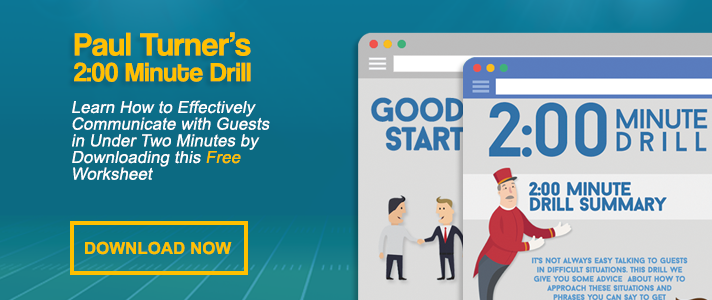You’re driving home from your most recent event.
Thinking.
Pondering.
Analyzing.
How did it go?
There were a few unexpected incidents, and you were not ready for them.
Those poor part-timers looked petrified by the rush of people during the lightning storm.
You should’ve gone over what exactly to do during a severe weather incident.
Tonight’s event was a little too chaotic for your taste.
What to do, what to do?
What do you do?
When was the last time you had similar thoughts running through your mind after an event?
It must be troubling to experience this on a regular basis knowing there’s more to come.
You use analytics to better respond to incidents.
But, how do you train your employees to better respond to all these incidents you’re aware of?
Read between the lines, and you’ll find the solution: role-playing.
ROLE-PLAYING: ANALYTICS FOR PEOPLE
We didn't trademark the above adage so feel free to use it.
Sharing is caring, and we’d like to help you any way we can.
Try this on for kicks.
Role-playing is being used by organizations worldwide for process improvement.
This isn’t the latest lean management trend.
Role-playing has been benefiting businesses for decades.
Think about it.
As a leader, what’s one of the biggest challenges you face regularly?
Training staff of course, especially the part-time staff.
Agree?
We know this because you tell us all the time.
Integrate role-playing techniques into your training process and watch your team get it.
Creating a role-play process for current, new, and temporary staff allows you to combine necessary policies and procedures into a scenario where staff not only learns what you need them to do but how you need them to do it!
It works, and we know this.
Well, because we use it to develop our software.
We listen to you, the experts, and then walk through it ourselves.
This is how we get it – and get it right.
We develop our software, and then we role-play to test it.
That’s how we create super-innovative, super-intuitive, super awesome software for the world’s greatest properties.
Empower your team and introduce them to intuition – It’s a beautiful thing.
Your team becomes proactive rather than reactive to all things.
Developing their instincts thru role-playing affords them the ability to be well prepared for events – and most importantly – perform better.
Safer events are the effect of top-notch preparation. Be prepared!
We wouldn’t throw you to the ‘lions’ without sharing all the advantages.
When you’re driving to work this morning think about the 9 benefits you see below.
Consider how implementing this will change the way your boss perceives your abilities, and how you and your staff perform at every event here-on-out.
BENEFITS OF ROLE-PLAYING
1. Creates Accountability
Running through scenarios with your team focuses them.
Everyone learns the requisites, which make up a safe and secure event.
You can use this time to assess their abilities effectively, coach them, and then hold them accountable during your next event.
Give them the tools and hold them accountable.
Easy enough.
2. Team Feels Valued
Taking time to train your staff puts a twinkle in their eye.
Share the wealth with your employees.
With all the effort you put into your events, apply that same energy to training your team.
Role-playing allows you to find the root of the problem.
Whether it’s an issue with your process or staff-related matters, you can dig into the details.
Acknowledging your team and their role shows them how important they are for the collective.
Get the big picture?
3. Challenges Employees
If you’re the smartest person in the room, you’re in the wrong room.
Rather than dictating, let your team work out ideas for your operation.
When walking through different scenarios, they may find specific details in the process to improve.
Remember, they’re the ones on the frontline.
They see everything first.
Role-playing gives you and your team the freedom to work it out and test theories.
Make mistakes now, not when it matters most.
4. Builds Team’s Confidence
Successful people are confident.
So are successful teams.
Develop your employees into proactive professionals.
Role-playing results in the sense of self-awareness your team can carry to the playing field.
All the training allows them to tweak their know-how with all the advantages of it not being real life.
Then, when you give them feedback, they know they’re making it all go right.
Foster an environment of confidence and reap the benefits.
5. Produces More Solutions
Within the act of documenting incidents, analyzing them, and communicating them rests the possibility of so much that can go wrong or right.
There are several steps in your process you can fine-tune or change.
You can improve your process, making your team better aware of all incidents occurring during your event.
Acting out everyday events and how to respond will surface an array of new solutions to your arsenal.
This will strengthen your team’s effectiveness.
We’re in the business of solutions (and you should be too).
6. Enhances Awareness
More answers lead to increased awareness of any and all incidents occurring at your property.
Train your employees to understand the impact of their roles.
Role-playing that leads to a more aware workforce results in reduced response times and lives saved.
It’s that ripple effect that’s seen throughout your business leading to a memorable experience for your customers.
7. Increases Productivity
Ultimately, your training efforts will produce a high-performing team.
What do high-performing teams do? They produce!
Better documentation.
Better Analytics.
Better Communication.
Better Awareness.
Role-playing affords you and your team the ability to be super successful and less stressed.
8. Builds Your Credibility as a Leader
Defining yourself as an effective leader includes over-preparing, over-learning, and over-achieving alongside your team.
It’s simple math really: you + your team + role-playing = safer events.
9. Results in Safer Events
Make it all easy.
Staff changes, but training them on how to follow your communication protocols should be painless.
Create a flexible and easy-to-execute system for communication among team members.
Empower your staff – take your communication and operations to a whole new level with role-playing.
What’s the result?
Safer events for customers.
OVER TO YOU
It’s simple.
Give your team purpose, role-play, and then reap the benefits.
Don’t be afraid to get everyone suited up to conduct real-life scenarios. It’s the closest thing you get to the real thing without consequence.
Editor's note: This post was originally published in June 2014 and has been updated for comprehensiveness and freshness.




